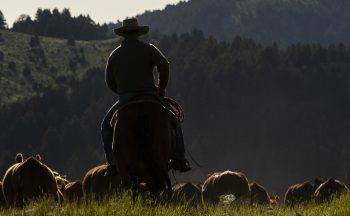MSU study: Climate change generating anxiety and distress for Montana farmers, ranchers
By Anne Cantrell, MSU News Service
BOZEMAN — Researchers have known for years that the current and projected impacts of climate change present challenges for agricultural productivity, with potentially serious consequences for farm and ranch livelihoods. But what hasn’t been clear is what this means for farmers’ and ranchers’ mental health.
Now, a new study of 125 Montana farmers and ranchers shows that more than 70% of those farmers and ranchers agree that climate change is having an impact on their agricultural business. Moreover, nearly three quarters of the respondents say they are experiencing moderate to high levels of anxiety when thinking about climate change and its effects on agricultural business. The study was conducted by researchers in Montana State University’s Department of Health and Human Development and Department of Political Science. It was published online Feb. 20 in the Journal of Rural Mental Health.

Montana State University livestock operations assistant Tyrell McClain moves angus cattle Thursday, July 5, 2018 at the Fort Ellis Research Farm in Bozeman, Mont.
MSU photo by Kelly Gorham
“This study demonstrates that climate change is generating anxiety and distress for farmers and ranchers,” wrote Meredith Howard, the study’s lead author who graduated from MSU in 2018 with a master’s degree in community health. “To maximize public health preparedness efforts, interventions are warranted to provide climate adaptation education and therapeutic outreach specific to agricultural workers experiencing economic struggle in the context of climate change.”
Howard’s coauthors include Selena Ahmed, associate professor in the Department of Health and Human Development in the College of Education, Health and Human Development; Paul Lachapelle, professor in the Department of Political Science in the College of Letters and Science; and Mark Schure, assistant professor in the Department of Health and Human Development.
To conduct the study, the researchers created a survey to assess perceptions of climate effects on anxiety levels by combining an adapted version of a survey for measuring climate change perceptions with a survey assessing anxiety symptoms.
They administered the surveys to farmers and ranchers at two different agricultural conferences in Montana. They also emailed an online version to farmers and ranchers on the lists of three different Montana agricultural organizations. Open-ended survey questions explored specifically how climate change is impacting mental well-being.
The researchers found that approximately three-quarters of the 125 Montana ranchers and farmers who completed the survey believe that climate change is negatively impacting their production operations and that it was causing them to experience higher levels of anxiety. They also found that higher risk perceptions of climate change impact is associated with higher reported anxiety.
“I think all of us had a sense there were impacts to producers, but none of us expected that the numbers would be so high – that the overwhelming majority of respondents would agree that climate change is having an impact on agricultural business and that profitability was found to be identified as the main cause of distress,” Lachapelle said.
The findings provide important understanding of some of the stresses that farmers and ranchers face, according to the researchers.
“Given the stress that producers are already under, this added stress is important to understand and address, particularly given the aging demographics of this population in Montana,” Lachapelle said.
In their published study, the authors note a number of challenges that could contribute to agricultural productivity challenges. Those include evidence that temperatures in Montana are increasing at a rate that is approximately two times greater than the average global temperature shift associated with climate change. In addition, scientists have found that increasing temperatures, coupled with a decrease in precipitation, can challenge irrigation capacity, limit full crop development and increase the amount of crop pests in Montana. Increasing temperatures also induce substantial heat stress for livestock, reduce forage quantity on livestock rangeland, and increase the risk of wildfires.
“I don’t know if a lot of people think about the link between climate change and mental health,” Howard said. “Since agricultural workers play a crucial role in supporting overarching food systems and national food security, it is important that we support their mental health by providing psychological support and by also offering resources on climate change adaptation and mitigation strategies.”
Alison Harmon, dean of the College of Education, Health and Human Development, called climate change a “complex multifactorial global issue, the implications of which cross numerous disciplinary boundaries at MSU.”
“This study demonstrates how researchers can collaborate across departments and colleges to address impacts on Montana producers. Global change will certainly impact our mental health, and I am glad to see this recognized here,” Harmon said.
“This is critically important research for the state of Montana and appropriate to Montana’s land-grant university,” said Nic Rae, dean of the College of Letters and Science. “Kudos to all the faculty involved.”
The study is available online at psycnet.apa.org/doiLanding?doi=10.1037%2Frmh0000131. •






